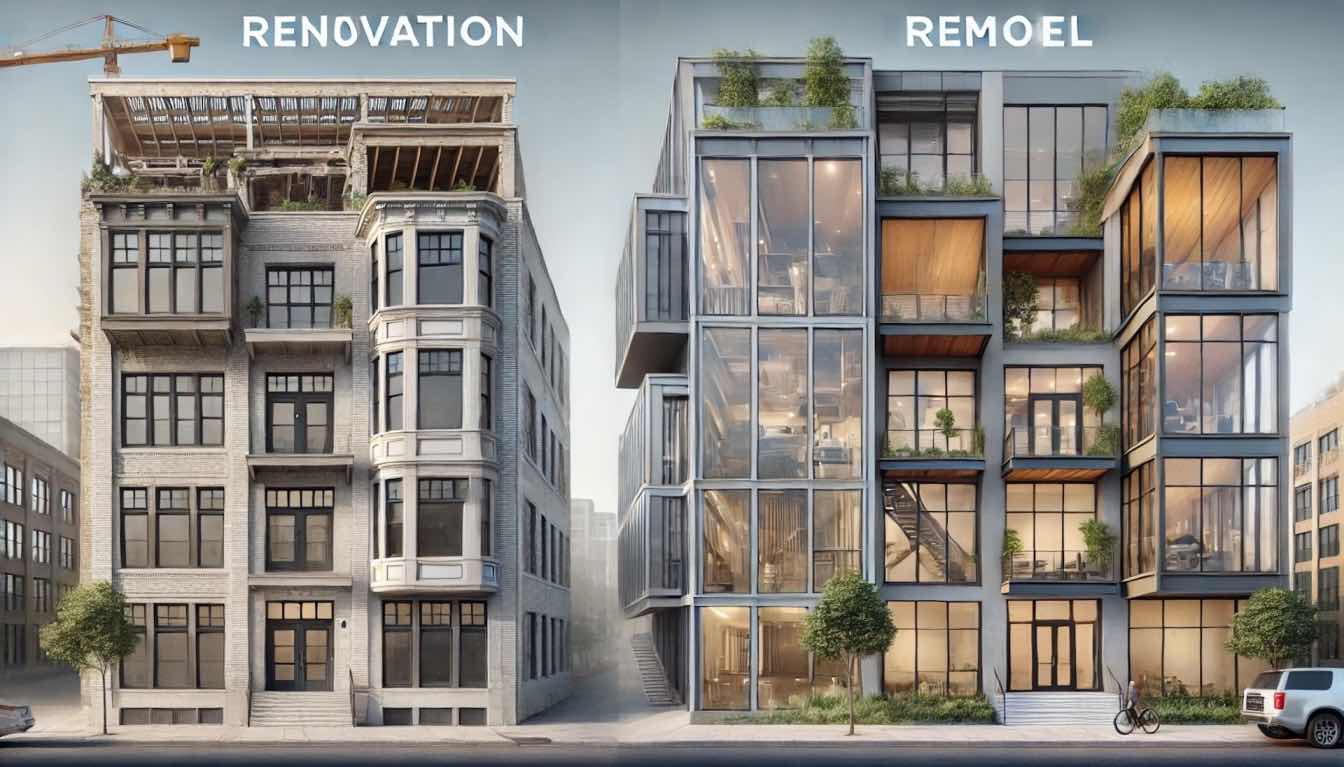Renovation and remodeling are terms often used interchangeably, yet they refer to different processes in home improvement. Renovation involves restoring or updating structures, often keeping the original design intact. On the other hand, remodeling means changing the structure, layout, or both, of a space. This distinction can significantly impact planning, budgeting, and the overall scope of any home improvement project.
Homeowners often grapple with choosing the right approach. Whether upgrading an old kitchen or completely transforming a living room, knowing when to renovate and when to remodel can save time, money, and effort in the long run.
Definitions and Key Differences
Understanding the distinctions between renovation and remodel is crucial when deciding the scope and nature of a project. This section explores the definitions, key differences, and what each entails.
Definition of Renovation
Renovation refers to updating or refreshing a space without altering its fundamental layout. This process often involves cosmetic changes, such as painting, flooring, and new fixtures. The goal is to rejuvenate and modernize while keeping the core structure the same.
In many cases, renovations can be less expensive than full remodels, making them an appealing option for homeowners. General Contractor Allen, TX, often handles such projects to meet specific aesthetic or functional needs.
Definition of Remodel
Remodeling involves altering the original structure or layout of a space. This can include moving walls, changing room functions, or adding significant architectural elements. The aim here is to change the room’s function or appearance dramatically.
Remodeling projects typically require more extensive planning and permits. They can be more costly and time-consuming compared to renovations and often call for specialized expertise, such as that provided by General Contractor Allen, TX.
Comparing Renovation and Remodel
Renovation is about updating and refreshing without major structural changes. Remodeling, meanwhile, involves making significant alterations that may require extensive planning. Understanding these differences helps homeowners make informed decisions based on their needs and budget.
Planning and Design
Effective planning and design are critical for any renovation or remodel project. Careful consideration of design elements, budget, and the choice of a general contractor ensures success.
Design Considerations for Renovation
Renovations often aim to restore or update. Maintaining the original structure is key. Aesthetic upgrades such as new paint, flooring, and fixtures are common. For homeowners aiming for high-quality results, selecting the right professionals is crucial. Interior and exterior painting are among the most effective renovation methods to refresh a space without structural changes. Partnering with experienced providers—such as Brothers Colors Painting, a trusted name for those seeking South Bend painters—ensures reliable workmanship and attention to detail. The right partnership can help maintain both aesthetics and long-term value in your renovation project.
Budget constraints play a significant role in renovations. It's important to prioritize areas needing the most attention. Structural integrity should always be checked to avoid unforeseen issues.
Functional improvements, like updating electrical systems or plumbing, can also be part of renovations. They aim to enhance living conditions without altering the original layout.
Design Considerations for Remodel
Remodeling involves changing the structure or layout. This could mean creating an open floor plan or adding new rooms. It's more extensive than renovation.
Architectural plans are often required. These outline changes and ensure everything complies with local building codes. Consulting with architects and designers can provide valuable insights.
Cost estimation is crucial. Remodeling is typically more expensive than renovating. Allocating a budget and preparing for unexpected expenses can prevent financial strain.
Hiring a General Contractor
Hiring a general contractor is often necessary for large projects. Allen General Contractor, for instance, offers comprehensive services from planning to execution.
Credentials and experience should be thoroughly reviewed. Look for licensing, insurance, and previous work samples. These ensure the contractor’s capability and reliability.
Clear communication is essential. A good contractor keeps clients informed and transparent. Written contracts detailing scope, timelines, and costs are also vital.
Client feedback and reviews from former customers provide a clearer picture of the contractor’s performance. Positive testimonials often indicate satisfactory outcomes.
Costs and Budgeting
Renovation and remodeling projects differ in cost and budget requirements due to the varying scopes and complexities involved. Understanding key cost factors and effective budgeting strategies can help ensure successful project completion.
Cost Factors for Renovation
Renovation costs depend on the extent of updates and materials chosen. Material quality plays a significant role in total expense. For instance, opting for high-end flooring or custom cabinetry will increase costs.
Labor costs vary by region. Skilled labor may be more expensive in urban areas compared to rural ones. Permits and inspections are other considerations. Some renovations may require local government approvals, adding to the budget.
Unexpected repairs can also impact renovation budgets significantly. Older homes might reveal hidden issues like electrical or plumbing problems once walls or floors are opened. Being prepared for these additional expenses is crucial.
Cost Factors for Remodel
Remodeling projects generally have higher costs due to their complexity. Unlike renovations, remodeling involves altering the structure or layout of a space, which typically requires more extensive work. Hiring specialists such as architects or structural engineers adds to the cost. Material costs are also higher in remodels.
Permits and inspections are nearly always necessary for remodeling, adding to the overall financial burden. The extent of disruption to existing structures can lead to more contingency costs. Ensuring the budget includes a buffer for unexpected challenges is wise.
How to Budget Effectively
Creating a detailed budget begins with a clear scope of work. Itemize every element of the project, from materials to labor. Use a spreadsheet to track costs and ensure nothing is overlooked.
Obtaining multiple quotes from contractors and suppliers ensures fair pricing and helps avoid budget overruns. Comparing costs allows homeowners to choose the best fit for their financial plan.
Setting aside a contingency fund is crucial. Unanticipated expenses are common in both renovations and remodels, so a buffer of 10-20% of the total budget is recommended. Regular financial reviews keep the project on track and identify cost-saving opportunities.
Legal and Regulatory Considerations
When considering a renovation or remodel, it is crucial to be aware of several legal and regulatory aspects. Understanding the requirements for permits, building codes, and insurance can save time and avoid potential fines or legal issues.
Permits and Approvals
Securing the necessary permits is an essential step before beginning any significant renovation or remodel. Local authorities usually require permits to ensure that the work complies with safety and zoning regulations.
Homeowners should contact their city or county's planning department to determine which permits are necessary. Common permits include building, electrical, plumbing, and mechanical permits. Without proper permits, there can be legal repercussions, fines, and complications when selling the property.
Building Codes and Regulations
Building codes are designed to ensure the safety, health, and general welfare of the public. These codes dictate the standards for construction and land use. Key areas covered by building codes include structural integrity, fire safety, electrical systems, and plumbing.
It is important to hire licensed professionals who are familiar with local building codes to avoid potential issues. Inspectors will visit the site to verify that the work meets all regulatory standards before approving the completed project.
Insurance and Liability
Homeowners should verify that their homeowner's insurance policy covers renovation or remodeling work. Many policies might not cover damage caused during construction or by an unlicensed contractor.
It is crucial to require contractors to have insurance that covers liability and worker’s compensation. This ensures that the homeowner is not liable for any injuries or damages that occur during the renovation or remodel. Proper insurance coverage protects both the homeowner and the contractor in the event of accidents or unforeseen issues.





